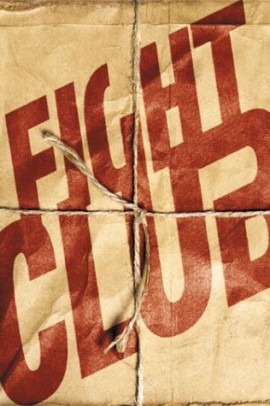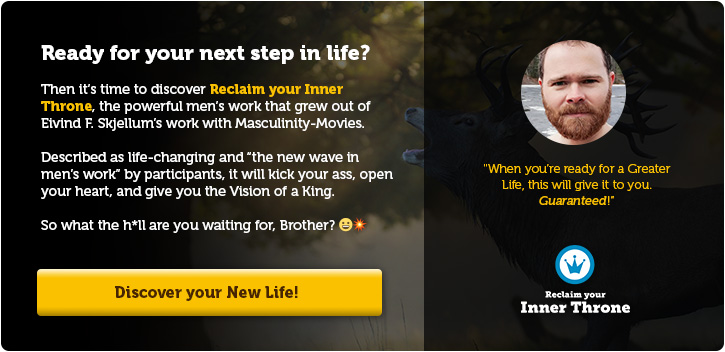Fight Club (1999)
Synopsis
Fight Club is a portrait of one man’s journey to reclaim the primal power of his inner masculine. The unnamed protagonist is an empty shell, a nobody going nowhere. He has a mind-numbing job and meaning in life boils down to redecorating his flat with new trinkets from the IKEA catalogue. When the wild and rebellious Tyler Durden shows up in his life, the stage is set for an enlightening tumble down the rabbit hole of his unconscious primal impulses. Fight Club is a brilliant exposition of the scars that form in a man’s psyche when his seat of masculinity is repressed by a society that looks for compliance rather than powerful individuation and an invitation to look closer at the wild man that lives within us all.

| Genre | Drama, Action |
| Production year | 1999 |
| Director | David Fincher |
| Male actors | Brad Pitt, Edward Norton |
Uncovering the inner wild man
by Eivind Figenschau Skjellum
Connecting with the grief of a lost manhood
Mr X – that's what I will name our protagonist – is not a happy man. He is numb, empty, and the sensations of life are but a distant shimmer beyond the veils of his pointless existence. He is a shadow, mist moving silently through the wastelands of existence. But it has gone too far, and Mr. X has now gone looking for release from bondage in myriad support groups for victims of life-threatening diseases. His disease is not of the body, but of the soul. It seems to carry across it a huge phantom scar of the life that was never lived.
He becomes a support group junkie, addicted to the human bonding and emotional release he finds there. Letting go into his pain seems to be a significant part of his personal journey. Finally he sleeps again. But his plan goes awry when he discovers a similarly inclined mysterious woman – Marla – who starts appearing at workshops. She is another lost soul who uses the pain of others to leech on to what remains of herself. Mr. X (or «Jack» as the movie also suggest) finds in her a perfect mirror of his own dishonest, apathetic, and life-destructive ways and his life is turned upside down once more. «If I had a tumor, I would name it Marla.» He is angry now, and the grieving is over.
Introducing Tyler Durden
Tyler Durden first appears on an airplane. Tyler is a free spirit – rebellious, full of vitality, and with some deep insight into what Jack longs for (death itself). In fact, he seems to know Jack's inner world very well. «That's clever,» he responds to one of Jack's carefully crafted comments. «How's that working out for you? Being clever.» Tyler sees that Jack, like so many men, uses irony and cleverness to keep his deep feelings of emptiness at bay, and challenges him on it. Jack hardly notices.
Jack returns from his business trip to a blown up flat and finds all his Ikea crap, including his prized Yin-Yang table, scattered smouldering on the ground. So the two of them move in together, settling in a derelict building on Paper Street on the outskirts of town. It starts out innocent enough, Tyler and Jack punching each other among the dumpsters behind a bar. But soon enough, Tyler pulls Jack deeper into his red emotion, and he discovers there a plentiful cache of repressed anger that has been eating away at him from the inside. Every Saturday, they go to fight on the tarmac behind the bar in that particularly desolate part of town, and new recruits arrive every week.
Jack has lost everything, but now that he's stopped dulling his senses, he is connecting with a deeper part in himself. He finds greater freedom in embracing a life featuring only the bare necessities. «By the end of the first month, I didn't miss TV.» (ditch your TV guys, it's killing you slowly)
Reclaiming the inner wild man
Inside every man is a seat of power, with deep roots extending from it, penetrating the rich, nutritious soil of the dark collective subconscious of our male ancestry that is its foundation. Upon it sits a wild man, a creature moist and hairy, asleep. He dreams hopeful dreams of the day when his lost son returns to the kingdom to reawaken him – the one who waits in shadows – so that the painful separation can finally end.
Tyler is such a wild man. But he is not asleep, he is quite awake. And now he stands in front of his devoted brothers – or are they disciples? – proclaiming to them the terms of participation in his private arena. «The first rule of Fight Club is you do not speak about Fight Club. The second rule of Fight Club is you do not speak about Fight Club.» Tyler demands from his men total secrecy. They move in shadows, like creatures of the night who find in darkness that which the light of day kept hidden. The source of their newly acquired vitality must be forever kept hidden.
This right here is incredibly profound. What is pointed to here is that this wild man has been pushed into oblivion, forced into damp cellars of the mind, so that the vessels of his essence – men across the planet – can be nice and servile little puppets of consumerism. He was first forced into hiding with the onset of the industrial revolution – when man was removed from his inner and outer nature – and now he is kept hidden in order to make possible the perpetuation of the widespread illusion that there is happiness to find in the pursuit of things, comfort and security. It suggests that men who want to reclaim their power must do so in secret, because masculine power has been deemed evil by society.
But for many men, fighting a friend can be an expression of love, a challenge for them to tap deeper into their power. This is something many women will never understand. When we men engage in such fighting, we are not being violent as much as we are challenging each other to be all we can be, to move from being trapped inside the head to being liberated into nature through the gateway of the body. Because society has become overfeminized and oversensitive, masculine love and masculine violence are lumped into the same category.
This turns the world into a spiritual wasteland for many men, for they can no longer access the seat of their power in a way that is condoned by society, and so become forever trapped in mental motions. The emptiness of this wasteland is the emptiness that Jack intuits, and its widespread damage on men's psyche is the cue for Tyler's invitation to go deeper into the shit of existence.
Tyler's wisdom
The true genius of Tyler is threefold: He exposes the complete dysfunction of our culture's basic assumptions about happiness, he shows the tremendous damage this delusion causes in the psyche of men, and he points to how inadequate existing feminine structures of bonding are in healing the wounds of a man who has lost contact with his wild ancestral roots.
In one scene, Tyler pours highly corrosive chemicals on Jack's hand and forces him to journey through the pain, as a means to access the power that comes from embracing death. Jack wants to escape, through methods he learned from women in the support groups.
– I'm going to my cave to find my power animal.
– No! Don't deal with this the way those dead people do!Come on!
– I get the point!
– No! You're feeling premature enlightenment. It's the greatest moment of your life, and you're off somewhere else!
In this scene, Tyler makes me contemplate the fact that much modern spirituality is about escaping life, not embracing it. It is about seeing the oneness of all things, seeing everything as love, everyone as beautiful. That is all fine, but lest the wild man is contained therein, lest we can see that shit of existence that Tyler Durden almost worships, it is castrated, escapist, and devoid of true potential to liberate any man. When people gather to talk about all that is happy, bright, and wonderful in the world, without being willing to embrace the inherent suffering of it all, the wild man falls into deeper sleep.
That wild man is the force within you that considers talk of flowers, meadows and butterflies (as long as it's part of an escapist philosophy) to be total bullshit. Nobody appreciates these things more than the wild man, but he does so from a grounded place of pure connection, and not from a dissociated ascension trip while trying to escape pain. The wild man knows that only on the other side of embracing the pangs of existence can nature's true appreciation occur. And when man does not appreciate nature, and gets stuck in living life as a constant evasive maneuver, bad things occur.
Society's disconnection from nature
We should now look at one of the most important statements this movie makes. Jack is working as a recall coordinator for a major car manufacturer. He investigates the damage caused when a car malfunctions, and calculates whether his employer will be better served financially by keeping dangerous cars driving on roads or if they should recall them to avoid standing responsible to plaintiffs in the courts. He turns the deaths of real people into numbers in financial estimates.
This is the society we have made. This is what happens when people turn complacent and docile as long as their private little bubbles are intact. This is what happens when people become so thoroughly hypnotized by consumerism and the overstimulation of media that we disconnect from the reality of others. And the very same people, people like you and me, who are willing to let people die to avoid having to pull our heads out of the sand, have the nerve to condemn people who engage in fist fights as medieval savages.
This is somewhat paradoxical. When we hypnotize ourselves out of our own misery, we let others die without batting an eyelid. We destroy the planet and think nothing of it. And to retain some sense of righteousness, we condemn others who are guilty of crime with fierceness.
That condemnation, unfortunately, is our personal guarantee that we are no different than they are, for if there's anything Jung has taught us, it is that those who you condemn are nothing but shadows of repressed parts of your own psyche. Wars are made in these ways. «You are not special. You are not a beautiful or unique snowflake,» Tyler tells his army.
There is something here for you. The illusion that we are special is a huge problem in modern, narcissistic society, and keeps us men apart from our true potential. For when we are "special", we live for recognition. Only when we embrace that we are just another human being is the humility in place to make us truly special. Only when we embrace that we are not special are we ready for true masculine power, true masculine spirituality. Embrace that you are not special and your eyes will open to nature's transcendent beauty. You become able to, like Katsumoto in The Last Samurai, realize the perfection in a cherry blossom. I propose that before we get our hands dirty, any recognition of that perfection is likely to be part of the carefully crafted escape route many of us lay out in order to avoid growing up.
Conclusion
There aren't only good things to be said about the view of our world that Fight Club presents. Far from it. And reality is perhaps not as bleak as it suggests. It should also be noted that too much goes wrong towards the end of the story to embrace the path these men walk. More than offering a solution, Fight Club describes the problem. And it does so extremely well. What happens to the man who disconnects from his true nature in order to serve the petty interests of his comfort-seeking ego and a dysfunctional society? The answer is for you to find.
Powerful ideas from Fight Club
- The path to liberation for a modern man goes via grief, into the physical, and ends up in integration.
- One of the primary requirements for spiritual liberation for any man is to get over the idea that they are "a beautiful snowflake".
- Repressing your inner truth will drive you crazy in the end.
- Your material possessions ultimately carry almost no meaning for your experience of happiness and meaning in life
- Tyler Durden suggests that the modern, neutered man who looks for deeper meaning will find it not in the presence of women, but of Brothers.
- Many modern men are desperate to break free from the prison of modern life. All they need is a way out.
- Domesticated men indirectly produce more evil in the world than violent thugs.
- To grow up, you need to embrace pain and the inevitability of death.
- Pursue your dreams as if your life depends on it.


